|
Limitar tu búsqueda
[+–] Creator
- Acevedo, Germán (1)
- Aguayo Tellez, Ernesto (2)
- Aguilera, Nelly (3)
- Ayala Gaitán, Edgardo A. (2)
- Cox-Edwards, Alejandra (2)
- Delgado, Guilherme C. (2)
- Eskenazi, Patricio (1)
- Guerrero, Ramiro (2)
- Hernández Ángeles, Domingo F. (2)
- Hu, Chiung-Yin (2)
- Lanza Queiroz, Bernardo (2)
- Manuel Gutiérrez, Diana (2)
- Martínez Cárdenas, Rubén (2)
- Martínez, Gabriel (6)
- Medici, André Cezar (1)
- Miranda, Martha (5)
- Orcí, Sandra (2)
- Pagés, Carmen (1)
- Querino, Ana Carolina (2)
- Ramírez Medina, Edgar (2)
- Rodríguez-Oreggia, Eduardo (2)
- Sana, Mariano (2)
- Scott, John (2)
- Sepúlveda Villareal, Ernesto (2)
- Sinha, Tapen (2)
- Valero Gil, Jorge (2)
- Zaragoza Castillo, Ricardo (2)
[+–] Editorial
[+–] Fecha
[+–] Formato
[+–] Idioma
[+–] Tipo de documento
[+–] Tipo de recurso
[+–] Classification
|

|
|
Seguridad social y desigualdad en México: de la polarización a la universalidad
El artículo documenta el fracaso de la seguridad social en México como instrumento de protección social y evalúa posibles estrategias de reforma. Se analiza la cobertura truncada para la población más vulnerable, la incidencia regresiva y desigualdades horizontales de los subsidios públicos a la seguridad social, y las consecuencias para la pobreza en adultos mayores y la desigualdad en...
|
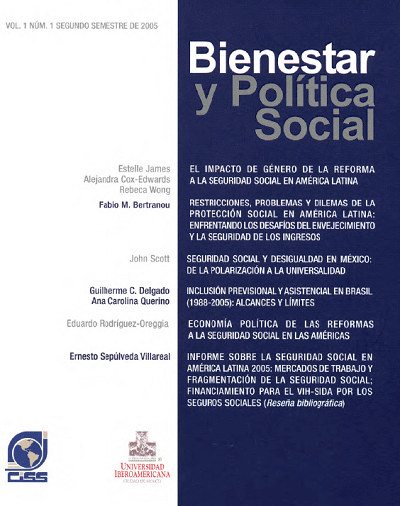
|
|
|
|

|
|
Programas de pensiones, empleo y familia
Los programas de pensiones, empleo y familia constituyen tres de las cuatro grandes categorías de la política social (la cuarta siendo los de salud). En este artículo se analizan opciones para su diseño dentro de un marco de universalidad de la seguridad social en México. Si bien estos programas tienen componentes de beneficios monetarios centrales, también requieren de estrategias sólidas y...
|
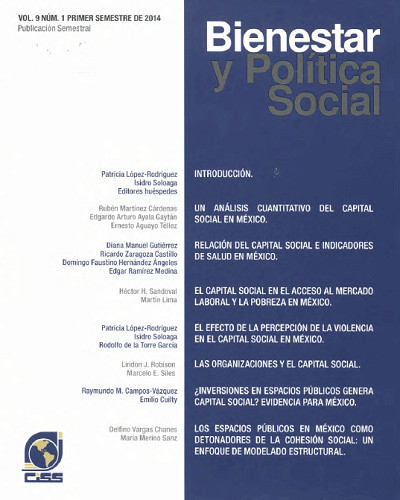
|
|
|
|

|
|
A quantitative analysis of social capital in Mexico
Se ha relacionado el capital social a la eficiencia en los mercados (Arrow, 1972), al refuerzo del contrato (Durlauf y Fafchamps, 2004) y en general al desarrollo y bienestar (Keefer y Knack 1997; Putnam 2000; Knack y Zak 2003). En el presente trabajo hemos investigado los determinantes del capital social empíricamente, centrándose en tres medidas comunes aproximadas de este: dos ligadas a la...
|

|
|
|
|

|
|
Social security pensions and retirement decisions in Mexico
Using Mexican cohort data for 1991-2000 this article examines the relationship between retirement decisions —the transition from work to labor market inactivity— and social security (contributive) pensions in less developed countries. The available large time series also makes possible to examine how a financial crisis that took place in 1995 has affected retirement incentives. In most Latin...
|
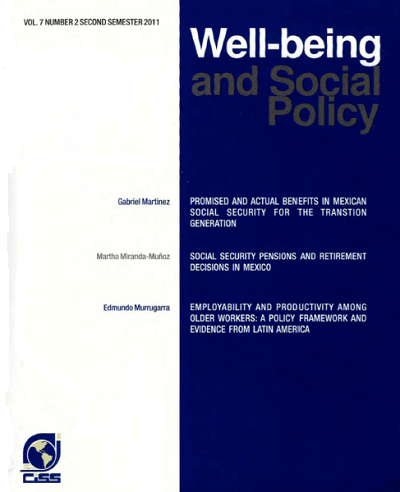
|
|
|
|

|
|
Book review. Beyond survival. Protecting households from health shocks in Latina America, by Baeza, Cristian C., y Truman G. Packard
The book by Cristian Baeza and Truman Packard is based on the next hypothesis: adverse health events reduce the consumption of goods and services different from health services, and many households become poor because of that. While the authors recognize that the evidence they present on the topic is limited, they propose the use of a “universal risk pool” as a way to eliminate the problem of...
|
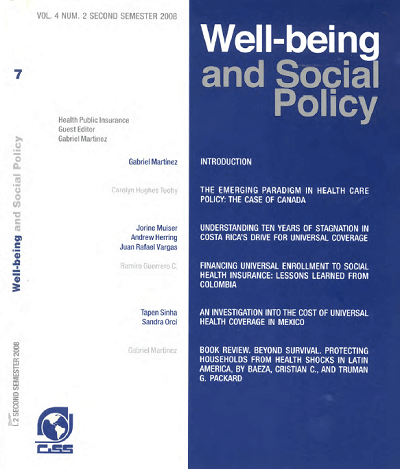
|
|
|
|

|
|
An investigation into the cost of universal health coverage in Mexico
The Mexican social security system, after operating for over six decades, has managed to provide healthcare for slightly over half the resident population.
There are wide geographical and socioeconomic variations in coverage. To provide wider coverage, the Federal Government created the Sistema de Protección Social en Salud (SPSS) for covering low income family. It becomes the third...
|
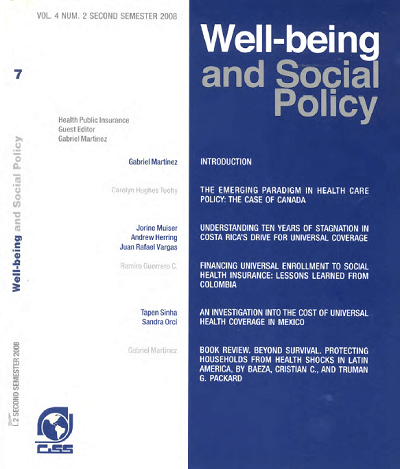
|
|
|
|

|
|
Financing universal enrollment to social health insurance: lessons learned from Colombia
The paper discusses the financing of the health care reform implemented in Colombia since the early nineties and explains the obstacles faced on the way to universal enrollment to social health insurance. The paper describes the reform and the sources created for its financing. It presents the observed trends in the financing of the insurance schemes created by the reform, identifies the...
|
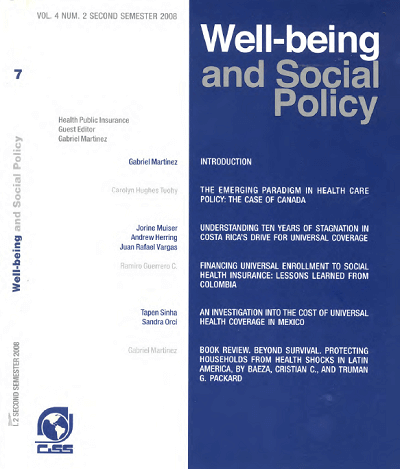
|
|
|
|

|
|
Retirement incentives: pension wealth, accrual and implicit tax
This paper estimates social security financial incentives for early retirement using contemporary techniques developed in economics, and compares these estimates to those estimated for developed countries. I find that implicit tax on continued work increases with age and amounts to over one-third of an individual potential earnings at age sixty-five. The pension replacement rate shows the degree...
|
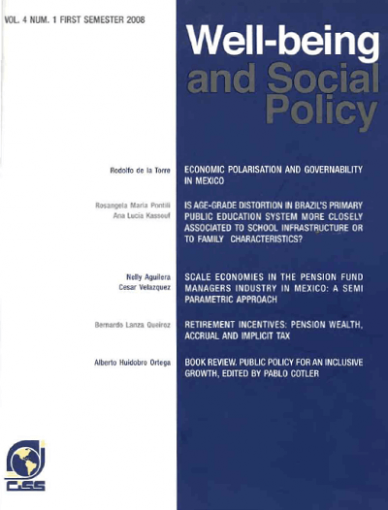
|
|
|
|

|
|
Is international migration a substitute for social security
The focus on short-term macroeconomic factors, including unemployment and wages, is insufficient to explain international migration. Institutional factors, bound to change only in the long run, can potentially have a large impact on migration flows. To illustrate this, we analyze Mexico-U.S. migration focusing on social security coverage, an important indicator of job formality. Using...
|
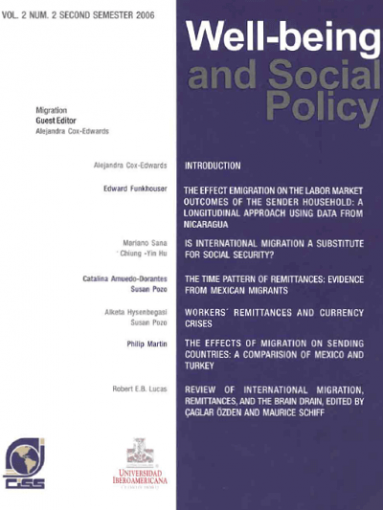
|
|
|
|

|
|
Introduction (about an international conference on "The effects of migration on sending countries")
The Inter-American Conference on Social Security (CISS) and Universidad Iberoamericana (UIA) co-hosted an international conference on “The Effects of Migration on Sending Countries” in February of 2006. The major objective of the conference was to examine a variety of channels through which migration affects the sending countries. Migrants change the dynamic of sending households; alter labor...
|
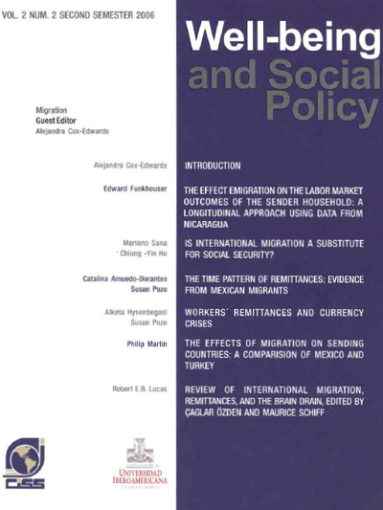
|
|
|
|

|
|
The Americas Social Security Report 2006 The challenges of aging and disability: employment and insurance, and international social security agreements (book review)
The 2006 Issue of the Report on Social Security in the Americas is divided in four chapters. The first two chapters address older-adult issues, the third chapter deals with disability-related problems, and the fourth chapter discusses Social Security agreements in the Americas. In the Presentation, it was pointed out that the objective of the Report on Social Security in the Americas is to become...
|
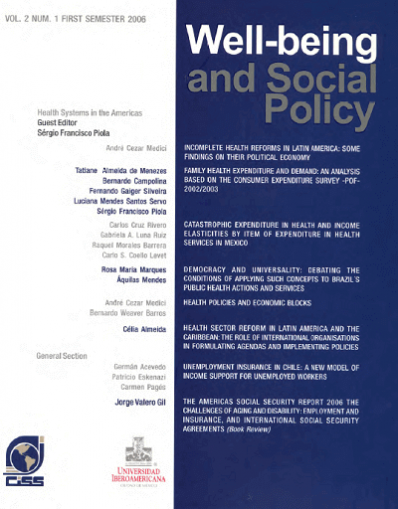
|
|
|
|

|
|
The Americas Social Security Report 2005: labor markets and the fragmentation of social insurance, financing for HIV-AIDS by social security (Book review)
The Americas Social Security Report 2005, published by the CISS, gathers the contributions, opinions, and comments of more than 30 social security specialists from different countries in the American continent, as well as the review of the most recent literature on this matter. The purpose is to present, to specialized public and to laymen, a detailed, analytic, and updated report of the...
|
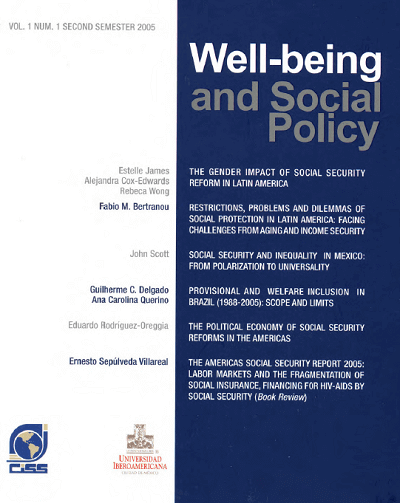
|
|
|
|

|
|
The political economy of social security reforms in the Americas
This paper analyses the factors affecting the decision to apply a reform (parametric and structural) in the Americas, which may hold a specific set of conditions, i.e. a sui generis political system and a high degree of economic openness, among others. Economic freedom is relevant in the case of structural reforms, while results for the share of older population are not conclusive. It may be that...
|
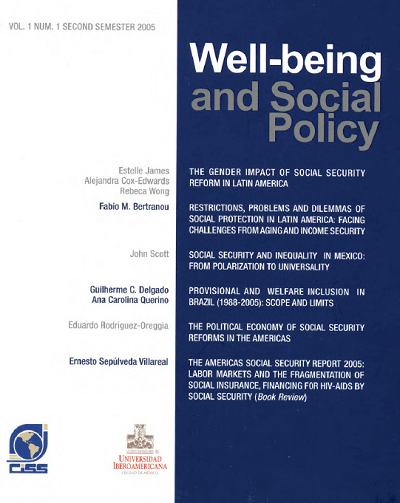
|
|
|
|

|
|
Provisional and welfare inclusion in Brazil (1988-2005): scope and limits
This paper analyses the influence of new rights derived from the Social Security System in Brazil after the Federal Constitution (1988). At least, three different and independent forces determinate the arrangements in social security policies: 1) the new social rights created by constitutional rules in response to social pressure; 2) the decrease of employment and wages in salaried jobs imposed...
|
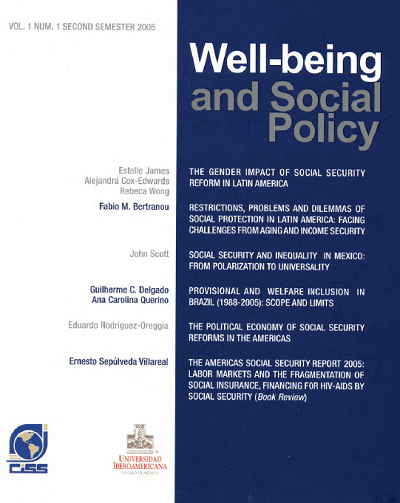
|
|
|
|

|
|
Social security and inequality in Mexico: from polarization to universality
The article documents the failure of social security in Mexico as an instrument of social protection and evaluates possible reform strategies. It analyses the truncated coverage of these systems for the most vulnerable, the regressive incidence and horizontal inequities of public social security subsidies, and the consequences for old-age poverty and inequalities in basic health opportunities. It...
|
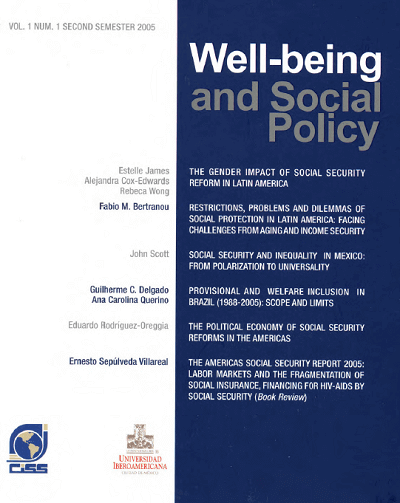
|
|
|
|

|
|
Seguro social de salud
El gobierno de México definió entre los años noventa y los dos mil principios de reforma a los seguros de salud e intentó implementarlos. Las principales iniciativas aprobadas definieron esquemas voluntarios, en un caso basado en aseguradoras privadas (que tienen muy baja penetración), y en otro, en una nueva instancia pública que funciona como mecanismo de distribución del gasto federal hacia...
|
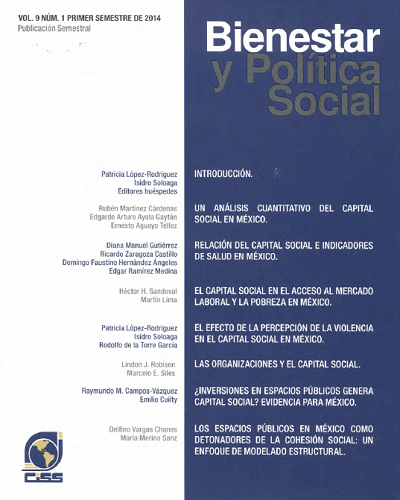
|
|
|
|

|
|
Seguridad social universal centrada en el ciudadano
Este ensayo revisa la situación de la protección social en México, así como diversas propuestas y opciones para su reforma. Una guía es el concepto de piso de protección social que han definido la Organización Internacional del Trabajo y la Organización Mundial de la Salud. Se tratan temas de forma más general bajo los grandes apartados de programas de familia, pensiones, salud y empleo, así como...
|
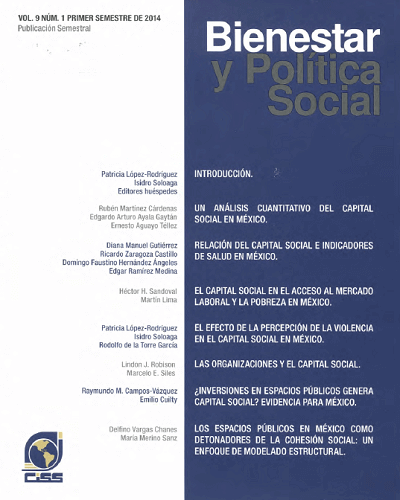
|
|
|
|

|
|
Inclusión previsional y asistencial en Brasil (1988-2008): alcances y límites
Este documento analiza la influencia de los nuevos derechos del Sistema de Seguridad social después de la Constitución Federal (1988). Al menos, tres fuerzas diferentes e independientes determinan los arreglos en cuanto a las políticas de seguridad social: 1) los nuevos derechos creados por las reglas constitucionales en respuesta la presión social; 2) la caída en el empleo y los salarios...
|
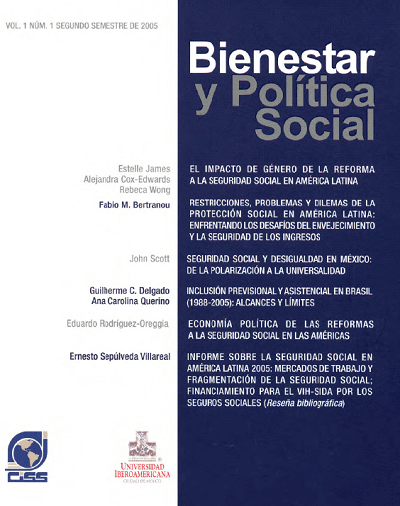
|
|
|
|

|
|
Migración internacional: ¿Sustituto de la seguridad social?
El enfoque en factores macroeconómicos a corto plazo, incluyendo el desempleo y los salarios, no es suficiente para explicar la migración internacional. Los factores institucionales, que cambian solo en el largo plazo, pueden potencialmente tener un gran impacto sobre los flujos de migración. Para ilustrar esto, analizamos la migración México-Estados Unidos enfocándonos en la cobertura en...
|
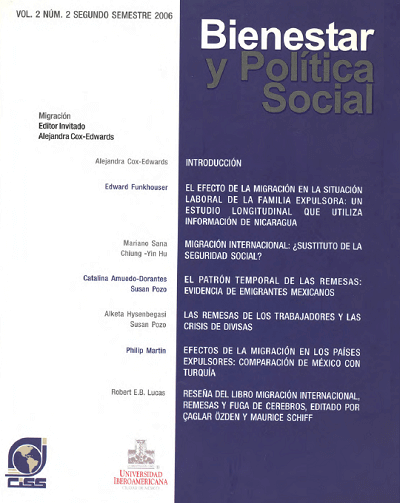
|
|
|
|

|
|
Economía política de las reformas a la seguridad social en las Américas
Este artículo analiza ciertos factores que inciden en las decisiones sobre implementar reformas, paramétricas o estructurales en las Américas. Esta área posee un conjunto muy específico de condiciones, por ejemplo un sistema político sui géneris con un alto grado de apertura económica, entre otros. El grado de libertad económica es relevante para las reformas estructurales, mientras que el...
|
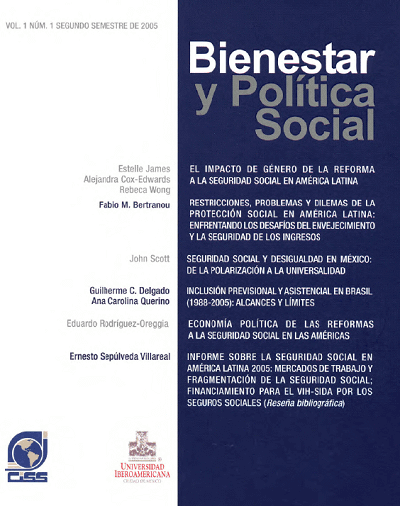
|
|
|
|
|